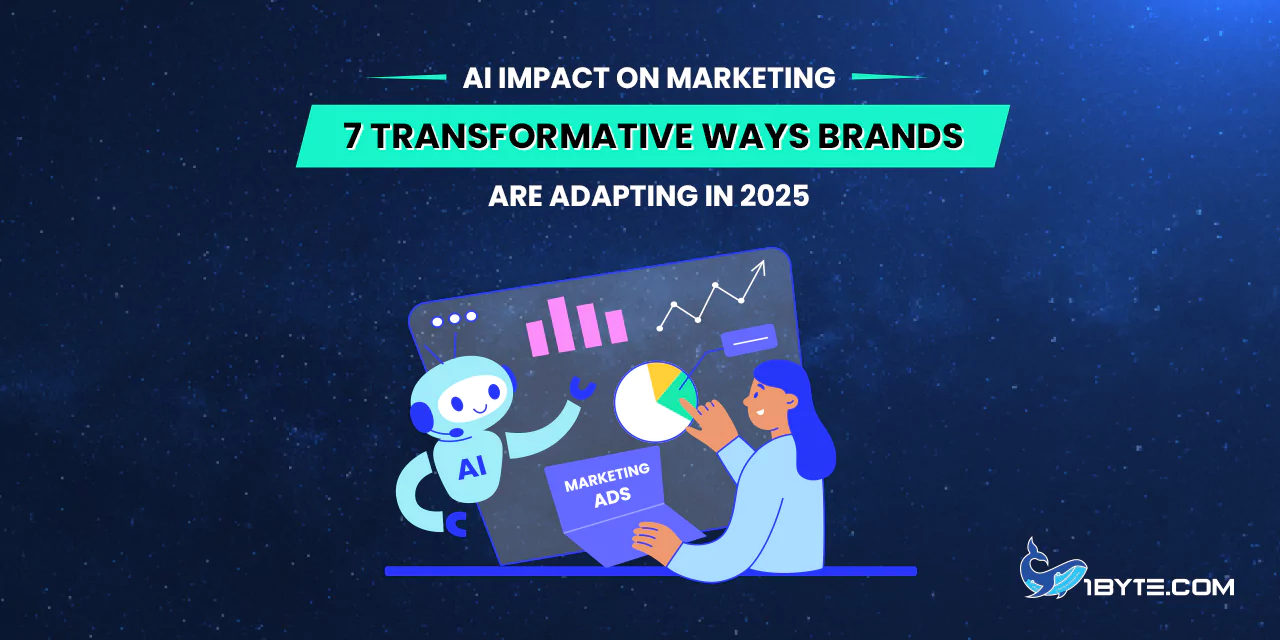In 2025, the strategies in marketing employ artificial intelligence (AI) at a rapid pace. McKinsey’s survey shows that 78 percent of organizations are embedding AI into at least one business function that they weren’t working with such technologies until last year, when only 55 percent were doing so. The adoption of AI in the marketing sector has already reached the boom levels, the industry will be worth $47.32 billion in 2025 as compared to $12.05 billion in 2020. Indeed, the AI impact on marketing simply can’t be dismissed.
Currently, brands are utilizing AI as a means to better personalize, improve advertising, and increase engagement with customers. For example, AI helped Delta Air Lines link its Olympic potential sponsorship to additional $30 million in sales of its tickets which absolutely shows how AI can tie marketing back to revenue.
However, to work effectively there are some challenges to bring over. There are concerns that data privacy and ethical implications can only be preserved while still having a human touch in marketing. In a report by Ascend2, 54% of marketers don’t trust that AI will gain them creativity and creative connection with humans.
The more technology advances, the more ethical concerns and human focus brands need to strike to keep the marketing strategy authentic and trustworthy. Read this article from 1Byte to find out more.
Personalized Customer Journeys at Scale
The AI impact on marketing is at an unprecedented scale. By 2025, 73% of consumers AI can and should play a crucial role in creating the individualized customer experience, and rightfully so.
Based on user behavior across multiple platforms, from the purchase history to the content preferences, the marketers can easily create detailed customer personas which they can use for delivering highly customized messaging at the most optimal moments. It would take this level of personalization to engage customers and create loyalty on a brand.

To give you an idea, Papa John’s International has deepened its partnership with Google Cloud so that AI can be used in its pizza ordering processes among others. The intention of this initiative is to customize interactions such as push notifications, marketing email, and the mail of customer loyalty, on the basis of how that customer has acted in the past. In addition to new features, a virtual online chatbot and ordering through virtual personal assistants is being introduced to improve the customer experience.
In addition, 70 percent of customer experience leaders are of the view that chatbots are now becoming capable architects of highly personalized customer journeys, pointing to a rather dramatic shift away from human play in customer interactions with the rise of AI. Such a trend makes it apparent that with the help of AI, we can offer customized experiences to customers on an individual basis.
With AI, brands can glean so much data and then use it to determine when the right time to reach out to a customer, increasing click-through rates and greater, more relevant connections. The more AI tech advances, so does the impact that it can have in marketing strategies and one day, it will be able to carry out truly sophisticated and effective personalization techniques.
AI-Powered Content Creation & Copywriting
The process of copywriting content has made it possible by artificial intelligence (AI). In 2024, 83.2% of content marketers plan to use AI to assist with content marketing efforts, compared with 90% in 2025 and 64.7% in 2023.
With AI powered tools, you are able to analyze data, scan for patterns and depending on your set goal objectives or predetermined parameters, be able to generate text automatically. Because of this, these tools enable a business to save time and reduce cost of content creation as well as improve quality and consistency of content being procured by the business.
Consider Omneky, a 2018 founded AI company that uses machine learning to develop various ad creations, test them, analyze based on performance data and optimize campaigns. In March 2025, Omneky almost made waves upon launch of Smart Ads, a product that turns intelligent, on brand ads and omni-channel campaigns.
Walmart also brought an AI tool called Trend-to-Product to increase the speed of rolling out fashionable clothing items from six months down to six weeks. That’s a consistent strategy that Walmart has with using AI to shed light on how competitiveness can be subtly sharpened and productivity gotten a boost.
AI in content creation is integrated to streamline workflows and personalization has been increased. With AI, brands can deliver specific content for specific audiences and make changes to engage with more efficiently and improve conversion rates. With AI technology developing, so does its place within marketing life, mainly because it allows companies to develop new ideas regarding the content creation and copywriting.
Predictive Analytics for Smarter Campaigns
Predictive analytics using AI is making marketing campaigns smarter. By 2025, 53% of marketing leaders are already using or planning to use AI to perform predictive analytics and customer insight. The three trends emphasize as AI is increasing in the understanding as well as prediction of consumer behavior.
In general, predictive analytics is the process or the steps taken to analyze past data in order to predict future outcomes. It does this by improving on this process by factoring in complex patterns and trends from large datasets thus allowing marketers to make better informed decisions. For instance, AI based predictive analytics can increase forecasting accuracy by 47% and therefore optimize the budget allocation and optimize return on investment.

AI is being used by companies to make advertising efforts directly tied to sales data. According to Delta Air Lines, for example, Alembic’s spiking neural network technology enabled attribution of $30 million in ticket sales to Delta’s Olympic sponsorship. This way, marketers are able to deduce the real effect of their campaigns directly, and make necessary changes in their strategies.
In addition, this renders digital twins achievable, which are virtual replicas of customers that make it easier to predict. These models enable marketers to simulate and forecast what consumers would do given a number of marketing strategies so as to better create marketing strategies and segmentation.
Including AI driven predictive analytics has become necessary as this enables the brands to predict market trends, personalize customer experiences and also optimize spends of marketing. As the AI technology further grows, its role in the construction of smarter and data driven marketing campaigns will grow to give business an edge in the competitive marketplace.
Chatbots Evolving into Brand Ambassadors
Another AI impact on marketing can be seen in AI-driven chatbots, which rapidly morphing into high caliber brand names. The global chatbot market is expected to grow from $4.2 billion in 2020 to $10.32 billion in 2025 at a CAGR (compounded annual growth rate) of 24.8% during the forecast period. The rise in emerging technologies for businesses, such as AI driven chatbots, to promote personalization in interacting with customers and further building up a brand’s identity is evident.
Now modern AI bots with 70% of customer support conversations are now able to be handled from the start to the end, which reduces customer support costs by 30%. This efficiency leads to running of operations with less businessmen and satisfaction of customers with prompt and accurate responses.
Additionally, using chatbots has become crucial in the lead generation strategies. Chatbots were implemented by a global airline to answer travel queries; which increased the conversion from such queries to booking by 20%. This proves how with the help of AI powered chatbot can effectively lead the prospects down the sales funnel, acting as proactive brand representative.
Today, with advances in AI technology, chatbots are becoming a kind of voice of a brand with its values and are offering consistent and personalized experiences to the users. In essence, this evolution makes AI chatbots an integral part of the marketing campaigns today and brand ambassadors that improve customer engagement and loyalty.
Hyper-Targeted Ad Campaigns via AI
Artificial intelligence (AI) has made possible the unimaginable levels of hyper targeting of advertising campaigns. In 2025, AI is able to analyze huge datasets so brands can deliver personal messages to certain profile segments, increasing the engagement and conversion rates.
AP-oriented AI platforms provide predictive analytics, automated ad creation, and hyper relevant campaigns at the right time. This way of working guarantees that the marketing efforts are targeted to those candidates who are more likely to convert, thereby optimizing ads spend and improve return on investment.

For example, WPP’s acquisition of InfoSum, a data collaboration platform, underscores the industry’s commitment to AI integration. The company’s technology lets advertisers use AI to solve marketing problems without moving or exposing data.
Also, AI is becoming more relevant in the application of hyper personalization. AI allows advertising campaigns to be targeted with real time adjustments made to ad serving as users interact with those ads and prefer them. This results in more effective and engaging ad experiences.
With our increasing focus on use of AI in marketing evaporates what’s still viewed as unachievable, personalization and advertising efficiency. The strategic approach presented in this paper enables it to not only improve customer experiences, but also increases in marketing performance and profitability.
Visual Recognition in Social Listening
With advanced visual recognition capabilities, social listening is much aided by artificial intelligence (AI) to bring in a real boost in marketing strategies. The AI in the social media market is expected to grow from $2.12 billion in 2024 to $2.7 billion in 2025 at a CAGR of 27.3% during the forecast period. But this growth helps turn losses into a highly important part of AI driven visual recognition in understanding consumer behavior.
With visual recognition technology, it is possible for brands to analyse images and videos shared in social platforms to pinpoint logos and products and even how they are being used without specific mentions. For example, AI tools can also find where a brand’s product is shown in user generated content, thus giving insight into how a brand is getting connected organically, and engaging with the audiences.
Businesses like YouScan have created AI-enhanced social listening platforms with image recognition strength. The benefit of these platforms is that they enable businesses to monitor, analyze and manage the visual content on it, analyze the consumer sentiment and effectively manage the online reputation.
The AI powered visual recognition into social listening gives brands a holistic view of their forthcoming and perception in the virtual world. It permits marketing strategies to be more informed, better engage the customer and manage the organization’s reputation proactively. However only, as AI technology continues to evolve, this impact on marketing through visual recognition in social listening will be more profound.
Ethical AI and Data Privacy Compliance
AI is the tool that is changing marketing while giving a new dimension to consumer marketing. Nevertheless, this advancement also poses a substantial ethical and data privacy problem. By 2027, 40% of organizations will experience a privacy breach due to AI, with 25% of them being malicious. With this statistic, it become plain that AI driven marketing strategies requires data protection measures.
People’s growing interest in the way corporations utilize people’s data in AI applications led to their great concern. Cisco also reported that 60 percent of consumers are concerned that businesses would use AI to their detriment and 65 percent are worried their trust is already gone thanks to it. The signs of scepticism and apprehension of AI growing uncontrolled is proof that transparency and ethical deployment of AI is of utmost importance.

Due to these concerns, regulatory bodies began to put into place stricter data privacy laws to protect individual citizens’ privacy rights. By the end of 2024, Gartner predicts that 75% of the world will be under modern privacy regulations and their personal data will be protected. Given the shift, marketers need to stay educated and adhere to new legal frameworks to avoid penalties and keep clients’ trust.
Yet, organizations have resorted to using privacy enhancing technologies (PETs) to protect personal information. According to TechInformed, use of AI—driven PETs like data anonymization and federated learning—can only contribute to stronger security and compliance. These work as some of the tools used in mitigating risk of data breach and unauthorized access.
On top of that, companies have started sounding out transparent AI governance policies. A McKinsey report notes that if left unaddressed, 71 percent of employees will not accept their employers’ actions concerning AI. Said guidelines, and ethical standards within the use of AI, not only help create trust internally but also protect customers confidence in the way their data is being handled responsibly.
Leverage 1Byte’s strong cloud computing expertise to boost your business in a big way
1Byte provides complete domain registration services that include dedicated support staff, educated customer care, reasonable costs, as well as a domain price search tool.
Elevate your online security with 1Byte's SSL Service. Unparalleled protection, seamless integration, and peace of mind for your digital journey.
No matter the cloud server package you pick, you can rely on 1Byte for dependability, privacy, security, and a stress-free experience that is essential for successful businesses.
Choosing us as your shared hosting provider allows you to get excellent value for your money while enjoying the same level of quality and functionality as more expensive options.
Through highly flexible programs, 1Byte's cutting-edge cloud hosting gives great solutions to small and medium-sized businesses faster, more securely, and at reduced costs.
Stay ahead of the competition with 1Byte's innovative WordPress hosting services. Our feature-rich plans and unmatched reliability ensure your website stands out and delivers an unforgettable user experience.
As an official AWS Partner, one of our primary responsibilities is to assist businesses in modernizing their operations and make the most of their journeys to the cloud with AWS.
Conclusion
In 2025, artificial intelligence (AI) will be reshaping marketing strategies, enabling brands to likely better target customers, foster customer engagement but ultimately focus on operational efficiency. McKinsey survey says that 78 percent of the companies have realized AI in at least one business function.
However, the adoption of AI in marketing isn’t without challenges. There is a great deal of concern around data privacy and ethics, with 40% of organisations saying they had suffered a privacy breach linked with A . In addition, two in every five marketers (54 percent) are afraid that adoption of AI may lead to loss of creativity and human touch.
With the development of AI, brands have to manage technological progress with ethical and human thought processes as well. In doing so, they are able to use the full power of AI in marketing and still keep the trust from consumers and authenticity.

